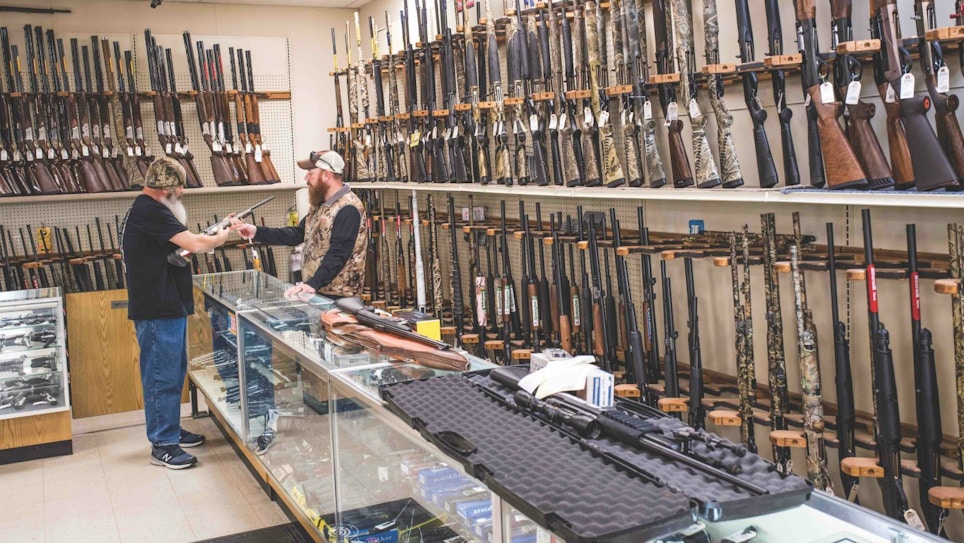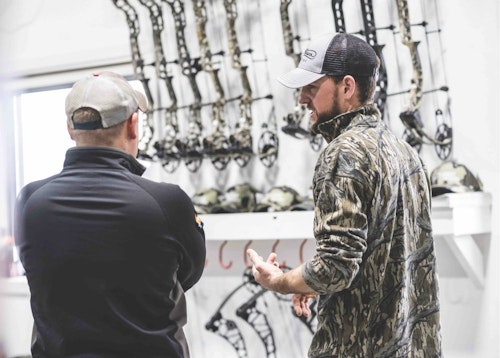Every industry needs salespeople. Whether those sales are institutional, business-to-business, online, factory direct or in a retail environment, each organization in the marketplace has to have employees who create relationships with its customers, manage their experiences and, yes, close the sale.
The basics of selling are the same no matter what the product is, but every industry is different; obviously, the products and services being sold differ enormously, but so do the demographics and behavior of the customers for those products and services. So, for the shooting sports industry, what skill set makes a good salesperson?
Walk With Personality . . .
At most major corporations utilizing large salesforces, especially those that are commissioned, one of the first things you will find present in the interview process for their sales positions is some sort of personality test. The company wants to determine if you have the appropriate personality type to sell and, specifically, to sell their products.
Each test may have slightly different criteria, but all agree that an effective salesperson should possess a few key qualities: They need to be outgoing, curious, and optimistic such that they are not easily discouraged, and they must remain cool in uncomfortable situations. Salespeople should be likable but not obsessed with being liked, and they should be goal oriented.
Everyone at some point in their life has met someone and thought, “That person is a natural at sales.” It’s true, some do have a knack for sales and do their jobs well with relatively little effort. It’s also true that some of those natural skills can be taught, but that is difficult and not often successful. The personality traits and inherent inclinations that make a person naturally good at sales tend to be in place by the time that person has reached adulthood. At its core, sales are about both a talent and a skill, but talent cannot be taught or developed quickly.
. . . But Talk With Knowledge
Beyond having a personality that closes sales, your salespeople must know the details of what they are selling and be able to speak intelligently about it. They must be able to understand the customer’s concerns and desires and respond with logical recommendations.
I once told a gentleman I was looking for a milling machine, and he tried to sell me a lathe, referring to it as “that machine over in the corner that takes the material off.” Needless to say, I did not buy the lathe. I did buy a milling machine (which he couldn’t identify) from that man for about a third of what it was worth — good day for me, bad day for him. A lack of product knowledge can be disastrous for a sales team. But with so many different types of products and services out there, how can one find the right combination of inherent sales talent and product knowledge? And, if forced to choose one or the other, what should an employer choose?
The “Gun (or Bow) Guys”
It is true that the shooting sports have some of the most educated and technically adept retail customers. No shoe buyer calls Adidas to inquire about the vulcanization process used in the rubber and at what temperature it cures its soles, but those types of deep-detail inquiries are common among firearms and bow buyers. Guns and bows are expensive products, and many customers are spending a significant portion of their discretionary income on them. As such, they educate themselves to make sure they’re getting what they want or need. This most often leads companies at all levels, but especially retail, to hire product experts as salespeople.
The thought process is that one must be a “gun guy” to talk intelligently to or sell to another “gun guy” (or gal) and that customers will reject canned sales palaver from someone they perceive as inauthentic. There is merit to this thought process, but we must remember balance.
Those who possess the most detailed technical knowledge on any subject are, perhaps surprisingly, often not the best people to present that knowledge in a sale or teaching context. That’s because the same personality traits that led them to accumulate that knowledge are actually opposite those required of a salesperson. Let me give you an example.
Early in my career in the firearms industry, I was confronted with a subject-matter expert who had decades in law enforcement and the firearms trade. He had a wealth of knowledge and taught me many things, but in a sales position, he was ineffective. Even though he was well-liked, many potential customers stayed just that — potential. He often led with the negative, overshared information that clouded the issue at hand, and prized the conversation over the sale. Indeed, he would shy away from difficult sales situations. Many attempts were made to train him on sales techniques, but it never did take.
Is it easier to teach a natural salesperson product knowledge, or to teach a product expert sales skill? I will tell you from experience like that I’ve just described and backed up with research, that it is the former. Any intelligent person can be taught product knowledge, but not every intelligent person can be taught or coached to effectively sell. If you can find someone who has both skill sets, good for you — but that doesn’t happen often. If forced to choose, your time and resources are much better spent hiring a sales professional and teaching them about firearms and archery than the other way around. In doing so, make the first element of their training admitting what they don’t know and have them refer tough questions to you or another expert when they’re working with a customer. That’s both honest and authentic — the customer will respect it, and you will have maintained the sales opportunity instead of lost it via someone who was unable to generate attention and interest.
There are places within every industry for all personality types and shooting sports is no different. But remember that sales and customer service are not the same thing — and while you may need product experts for the latter, you need salespeople for the former.







